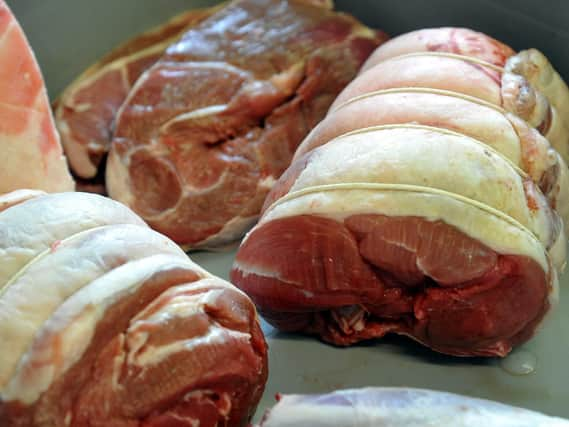Salmonella warning over pink meat


The Food Standards Agency (FSA) along with Public Health England and Health Protection Scotland are reminding people to take care when handling raw meat and to cook it properly after the spike in the illness.
This comes as the agency investigates a rise in cases of a particular strain of Salmonella Typhimurium which have been linked to lamb and mutton.
Advertisement
Hide AdAdvertisement
Hide AdThe FSA say it first saw an increase in cases of this particular type of salmonella in July 2017 and a number of control measures were put into place which led to a significant decline in cases at the end of that year.


However since June 2018, a further 165 cases have been reported (up to 19 October), which led to more control measures though this hasn't led to the same decline in cases as in 2017.
Colin Sullivan, chief operating officer at the Food Standards Agency said: "We are advising care when preparing all meat, including lamb and mutton, to reduce the likelihood of becoming ill with Salmonella Typhimurium. Our advice is to purchase food as normal but to take care when storing, handling and cooking raw meat.
"People should wash their hands after touching raw meat, avoid contaminating other food in the kitchen by storing it separately in the fridge and using different chopping boards and knives, and ensure that meat, particularly diced and minced lamb, is cooked properly."
Advertisement
Hide AdAdvertisement
Hide Ad-> Disgraceful vandals target poppy display at war memorial <-Public Health England say this specific strain is thought to be caused by cross-contamination with meat from affected sheep.
Nick Phin, deputy director, of PHE's national infection service said: "The likely cause of the increased numbers of this specific strain of Salmonella Typhimurium is considered to be meat or cross-contamination with meat from affected sheep.
"People can be infected with Salmonella Typhimurium in a number of ways such as not cooking their meat properly, not washing hands thoroughly after handling raw meat, or through cross-contamination with other food, surfaces and utensils in the kitchen."
-> Strong winds will bring cold morning to Britain in coming days <-What is salmonella?
Advertisement
Hide AdAdvertisement
Hide AdSalmonella infection (salmonellosis) is a common bacterial disease that affects the intestinal tract. Salmonella bacteria typically live in animal and human intestines. Humans become infected most frequently through contaminated water or food.
Salmonellas are a group of common bacteria that cause food poisoning. They are usually spread by inadequate cooking and through cross-contamination. Salmonella bacteria are most often found in:
raw meat
undercooked poultry such as chicken or turkey
eggs
unpasteurised milk
Will everyone get sick?
Young children, the elderly and people whose immune systems are not working properly have a greater risk of becoming severely ill with food poisoning caused by salmonella, but anyone can become poorly from the bacteria.
How to reduce the risk of salmonella poisoning?
Make sure that meat and dairy is kept chilled, and in a clean place.
Advertisement
Hide AdAdvertisement
Hide AdEnsure that food is thoroughly cooked and avoid any cross contamination.
Always wash your hands thoroughly with soap and warm water, before preparing or eating food and after handling raw foods.